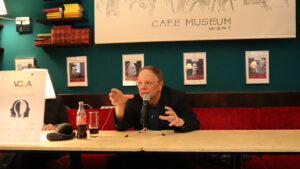LogicLounge 2024 with Georg Gottlob
Artificial Intelligence and Artificial Ignorance
| DATE: | Tuesday, May 28, 2024 |
| TIME: | 16:00 – 17:30 |
| VENUE: | Café Museum, Operngasse 7, Extrazimmer, 1010 Wien |
ABSTRACT
The conversation with Georg Gottlob will explore Artificial Intelligence's current state and challenges. It will also provide insights into the two main branches of AI research, symbolic AI and sub-symbolic AI, highlighting their achievements and limitations. The conversation will also delve into the recent advancements in generative AI, such as ChatGPT, and examine instances where these models excel and where they fall short.
REPORT
The series of public discussions LogicLounge, which is celebrating its tenth anniversary this year, was held on May 28 at Café Museum, which already served as a meeting place for Wittgenstein and the Vienna Circle. In his talk “Artificial Intelligence and Artificial Ignorance”, Professor Georg Gottlob, who recently joined the University of Calabria (Unical), provided guests with unique insights into the world of machine learning and large language models. The discussion, which is organized by the Vienna Center for Logic and Algorithms (VCLA), was moderated by journalist Sarah Kriesche (Ö1) for the third time in a row.
“The ghost of the previous tenant still lived in the building.” This was Georg Gottlob’s tongue-in-cheek explanation for his low credit limit during his time in Oxford. After all, numerous payment reminders bore testimony to the previous tenant’s tendency to leave his bills unpaid, and anyone who lives with such a person must be of a similar mindset. At least that was the train of “thought” of the AI-based system of the rating agency that set Gottlob’s credit limit. The system simply did not know that the previous tenant usually moves out as soon as a new tenant moves in – something that is common knowledge to human beings. And even if the conclusion in terms of payment habits can perhaps not be dismissed entirely, it is still highly questionable from an ethical point of view.
These and other limitations of AI-based applications were discussed at length during this year’s LogicLounge. Gottlob provided numerous anecdotes and observations ranging from self-driving cars (whereby he is looking forward to sending his car on its way instead of having to park it himself) to superior chess computers.
Another focus of the discussion was the optimization of sub-symbolic AI through a combination with symbolic AI, as the Cluster of Excellence “Bilateral AI”, in which the TU Wien is participating, has recently been approved by the Austrian Science Fund (FWF). Imagine two halves of the human brain that are responsible for different tasks. With sub-symbolic AI (right hemisphere), the focus is on machine learning, i.e., processing huge amounts of data using neural networks. This form of AI is ideally suited as a tool, e.g., in medical diagnostics. Symbolic AI (left hemisphere), on the other hand, deals with fact- and rule-based conclusions. We don’t have to learn the hard way that certain berries are poisonous – we are taught this information at a young age. It would therefore be ideal to combine sub-symbolic and symbolic AI. But who decides which rules are used and what leeway should be allowed in the implementation of these rules? If you would like to find out more about this exciting topic and the strengths and weaknesses of large language models such as ChatGPT, you can now watch the recording of the LogicLounge on the VCLA YouTube channel.
Georg Gottlob is a Professor of Informatics at Oxford University and a Fellow of St John’s College. He worked as a Professor in Computer Science at TU Wien, Austria, since 1988, and still holds an Adjunct Professor position in Vienna. From 2006 to 2011, Gottlob held the Chair of Computing Science at Oxford University, and then moved to the Chair of Informatics at Oxford, which he has been holding since January 2012. His current research deals with algorithms and complexity issues related to graphs and hypergraphs, database query languages, and with problem decomposition methods that can be used for recognizing large classes of tractable instances of hard problems.
About LogicLounge
The series of public lectures LogicLounge continues to bring together the general public and the experts from the fields of logic, philosophy, mathematics, computer science, and artificial intelligence. Since its inception at the Vienna Summer of Logic in 2014 – the largest event in the history of logic – the series has since been traveling between Vienna and the venue of the CAV (International Conference on Computer-Aided Verification), where it has already become a regular event in honor of Helmut Veith (1971-2016).

